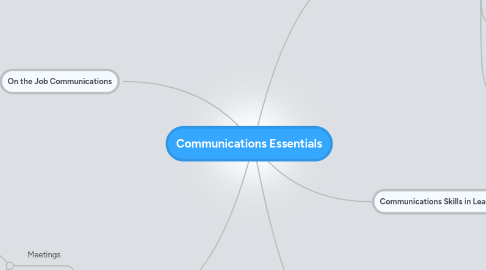
1. On the Job Communications
1.1. Type of Writing
1.1.1. Email (65%)
1.1.2. Presentation Preparation (30%)
1.1.3. Reports (5%)
1.2. Types of Speaking
1.2.1. Internal Face to Face Meetings
1.2.2. Internal Video/Conference Meetings
1.2.3. Customer Meetings
1.2.4. Presentations
1.2.5. Phone
1.3. Face to Face Communications
1.3.1. Business Meetings
1.3.2. Staff Meetings
1.3.3. Technical Meetings
1.4. Communication Challenges
1.4.1. Remote Employees/Customers
1.4.2. Judging the Level of Knowledge
1.4.3. Confidentiality
1.4.4. Choosing the Best Way to Communicate
1.4.5. Time
1.5. Additional Insights on the Importance of Communications
1.5.1. #1: Be Genuine
1.5.2. Make the Recipent Feel Important
1.5.3. Extemporaneously vs. Word for Word
1.5.4. Don't Be Afraid to Give Bad News... But Give Them Hope
2. Books
2.1. Meetings
2.1.1. Death by Meeting (Lencioni)
2.1.2. Read This Before Our Next Meeting (Pittampalli)
2.2. Presentations
2.2.1. Presentation Zen (Reynolds)
2.2.2. Slide:ology (Duarte)
2.3. 1 on 1 discussions
2.3.1. Crucial Confrontations (Patterson, et al.)
2.3.2. Crucial Conversations (Patterson, et al)
3. My Personal History
3.1. Education
3.1.1. Bradford Grammar School, Bradford, 1977
3.1.2. B.Sc EE - University of Leeds, 1980
3.1.3. M. Sc Engineering (Executive Engineering) - University Pennsylvania, 1996
3.2. Work History
3.2.1. Philips Research (3 years)
3.2.2. General Electric/Martin Marietta Lockheed Martin (14 years)
3.2.3. RF Micro Devices (15 years)
3.3. Training
3.3.1. GE Training Programs
3.3.2. Reading
3.3.3. Teaching
3.4. Community
3.4.1. Soccer Coach (1996 - 2011)
3.4.2. Communications Director, ORUMC 2009 - present)
4. Communications Skills in Leadership Roles
4.1. Areas which require good communication skills
4.1.1. Email
4.1.2. Presentations
4.1.3. Phone
4.1.4. Meetings
4.1.5. Everywhere!
4.2. Pitfalls to Avoid
4.2.1. Not being genuine
4.2.2. Talking Down to People
4.2.3. Too much detail - Focus on the approach first
4.3. Insights for Leading Teams
4.3.1. Understand that different people have different needs
4.3.2. Don't play favorites with privileged information
4.3.3. Ask for Input
4.3.4. Don't punish bad news
4.3.5. Be Inspiring, Not Dull
4.3.6. Walk the Talk
4.3.7. Every move you make is being watched
